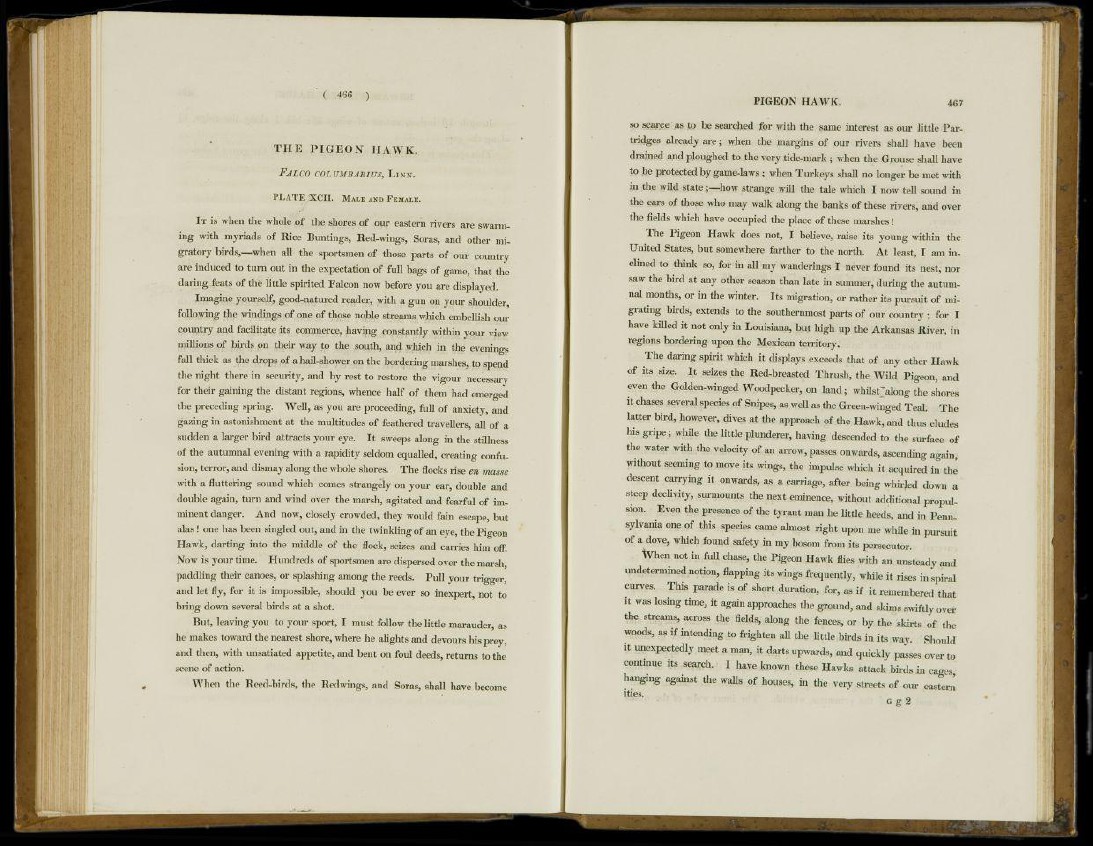
T H E P I G E O N HAWK.
FALCO COLUMBARIUS, LINN.
P L A T E X C I I . MALE AND FEMALE.
IT is when the whole of the shores of our eastern rivers are swarming
with myriads of Rice Buntings, Red-wings, Soras, and other migratory
birds,—when all the sportsmen of those parts of our country
are induced to turn out in the expectation of full bags of game, that the
daring feats of the little spirited Falcon now before you are displayed.
Imagine yourself, good-natured reader, with a gun on your shoulder,
following the windings of one of those noble streams which embellish our
country and facilitate its commerce, having constantly within your view
millions of birds on their way to the south, and which in the evenings
fall thick as the drops of a hail-shower on the bordering marshes, to spend
the night there in security, and by rest to restore the vigour necessary
for their gaining the distant regions, whence half of them had emerged
the preceding spring. Well, as you are proceeding, full of anxiety, and
gazing in astonishment at the multitudes of feathered travellers, all of a
sudden a larger bird attracts your eye. It sweeps along in the stillness
of the autumnal evening with a rapidity seldom equalled, creating confusion,
terror, and dismay along the whole shores. The flocks rise en masse
with a fluttering sound which comes strangely on your ear, double and
double again, turn and wind over the marsh, agitated and fearful of imminent
danger. And now, closely crowded, they would fain escape, but
alas ! one has been singled out, and in the twinkling of an eye, the Pigeon
Hawk, darting into the middle of the flock, seizes and carries him off.
Now is your time. Hundreds of sportsmen are dispersed over the marsh,
paddling their canoes, or splashing among the reeds. Pull your trigger,
and let fly, for it is impossible, should you be ever so inexpert, not to
bring down several birds at a shot.
But, leaving you to your sport, I must follow the little marauder, as
he makes toward the nearest shore, where he alights and devours his prey,
and then, with unsatiated appetite, and bent on foul deeds, returns to the
scene of action.
When the Reed-birds, the Redwings, and Soras, shall have become
so scarce as to be searched for with the same interest as our little Partridges
already are; when the margins of our rivers shall have been
drained and ploughed to the very tide-mark ; when the Grouse shall have
to be protected by game-laws ; when Turkeys shall no longer be met with
in the wild state;—how strange will the tale which I now tell sound in
the ears of those who may walk along the banks of these rivers, and over
the fields which have occupied the place of these marshes !
The Pigeon Hawk does not, I believe, raise its young within the
United States, but somewhere farther to the north. At least, I am inclined
to think so, for in all my wanderings I never found its nest, nor
saw the bird at any other season than late in summer, during the autumnal
months, or in the winter. Its migration, or rather its pursuit of migrating
birds, extends to the southernmost parts of our country ; for I
have killed it not only in Louisiana, but high up the Arkansas River, in
regions bordering upon the Mexican territory.
The daring spirit which it displays exceeds that of any other Hawk
of its size. It seizes the Red-breasted Thrush, the Wild Pigeon, and
even the Golden-winged Woodpecker, on land; whilst^along the shores
it chases several species of Snipes, as well as the Green-winged Teal. The
latter bird, however, dives at the approach of the Hawk, and thus eludes
his gripe; while the little plunderer, having descended to the surface of
the water with the velocity of an arrow, passes onwards, ascending again,
without seeming to move its wings, the impulse which it acquired in the
descent carrying it onwards, as a carriage, after being whirled down a
steep declivity, surmounts the next eminence, without additional propulsion.
Even the presence of the tyrant man he little heeds, and in Pennsylvania
one of this species came almost right upon me while in pursuit
of a dove, which found safety in my bosom from its persecutor.
When not in full chase, the Pigeon Hawk flies with an unsteady and
undetermined notion, flapping its wings frequently, while it rises in spiral
curves. This parade is of short duration, for, as if it remembered that
it was losing time, it again approaches the ground, and skims swiftly over
the streams, across the fields, along the fences, or by the skirts of the
woods, as if intending to frighten all the little birds in its way. Should
it unexpectedly meet a man, it darts upwards, and quickly passes over to
continue its search. I have known these Hawks attack birds in cages,
hanging against the walls of houses, in the very streets of our eastern
ities. G g 2